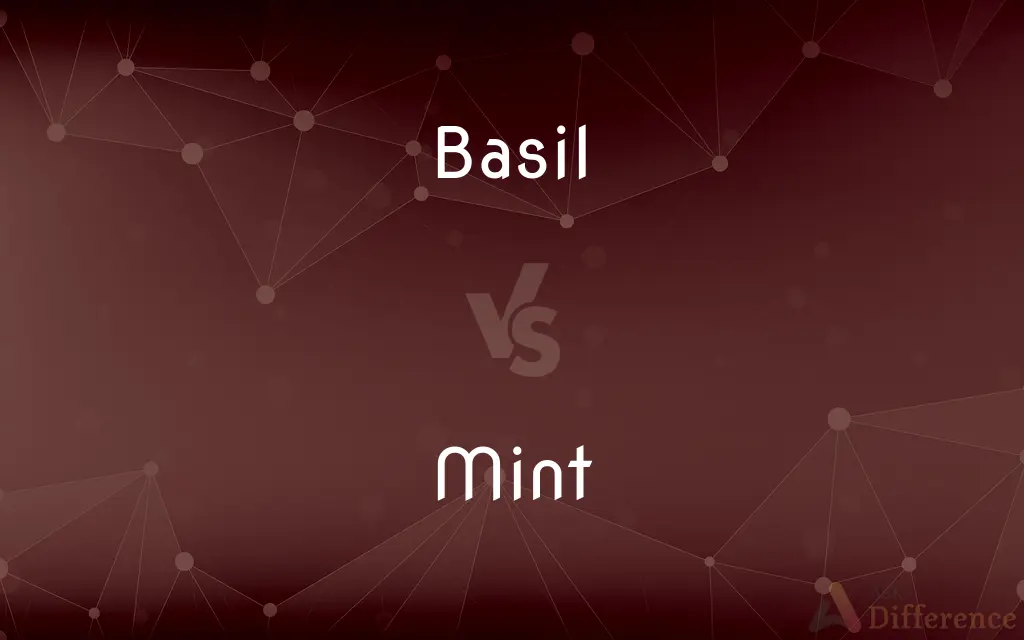Basil vs. Mint — What's the Difference?
By Fiza Rafique & Maham Liaqat — Updated on April 21, 2024
Basil is a herb known for its aromatic leaves with a sweet, slightly spicy flavor, essential in many Italian dishes, while mint is distinguished by its cool, refreshing taste and is widely used in beverages, desserts, and some savory dishes.

Difference Between Basil and Mint
Table of Contents
ADVERTISEMENT
Key Differences
Basil and mint are both popular herbs used in culinary applications, but basil features a sweet and slightly peppery taste, making it a staple in Italian cuisine, especially in dishes like pesto. Mint, on the other hand, offers a cool and refreshing taste, often used in drinks like mojitos and in dishes that require a fresh, clean flavor.
The leaves of basil are generally broad and shiny with a smooth texture, and it blooms small, white flowers when mature. Mint leaves tend to be smaller, ridged, and can be slightly hairy, with the plant often producing small, purple or pink flowers.
Basil is primarily grown for its leaves in warm, tropical climates, thriving in sunny and moist conditions. Mint grows vigorously in cooler to temperate climates, often spreading quickly and widely if not contained, making it easy to grow but sometimes invasive.
While both herbs are aromatic, basil's aroma is more pungent and sweet, with notes of clove, anise, and sometimes citrus, depending on the variety. Mint's aroma is distinctly sharp and clear, characterized by its high menthol content, which is cooling to the palate.
In terms of health benefits, basil is rich in antioxidants, anti-inflammatory, and antibacterial properties, particularly noted in varieties like holy basil. Mint offers digestive benefits, helping to soothe indigestion and reduce inflammation in the body.
ADVERTISEMENT
Comparison Chart
Flavor
Sweet, slightly spicy
Cool, refreshing
Common Uses
Italian cuisine, pesto, soups
Beverages, desserts, Middle Eastern dishes
Leaf Description
Broad, shiny, smooth
Smaller, ridged, slightly hairy
Growing Climate
Warm, tropical
Cooler, temperate
Health Benefits
Antioxidants, anti-inflammatory
Digestive aid, anti-inflammatory
Compare with Definitions
Basil
Grown for its lush, green leaves, often used fresh rather than dried to maintain its flavor.
Fresh basil leaves topped the margherita pizza, adding a burst of flavor.
Mint
Includes several varieties such as peppermint and spearmint, each with distinct flavors and uses.
Peppermint has a stronger flavor and is often used medicinally, while spearmint is milder and popular in cooking.
Basil
Celebrated for its health benefits, including its role in reducing inflammation and enhancing the immune system.
Basil oil is often used in traditional medicine for its health-enhancing properties.
Mint
Thrives in cooler climates and can grow in a wide range of conditions, from full sun to partial shade.
Mint plants in her garden flourished even with little direct sunlight.
Basil
Available in several varieties, including sweet basil, Thai basil, and holy basil, each with unique flavors.
Thai basil was used in the curry to impart a distinctive anise-like flavor.
Mint
Known for its cool, refreshing taste, mint is a versatile herb used in beverages, desserts, and savory dishes.
Fresh mint leaves were muddled into the lemonade, providing a refreshing summer drink.
Basil
Requires warm growing conditions and is sensitive to cold.
Her basil plants thrived in the sunny, sheltered corner of the garden.
Mint
Characterized by its vigorous growth habit, often needing containment when planted in the garden.
The mint spread quickly throughout the garden, filling the air with its crisp scent.
Basil
An aromatic herb with a sweet and slightly spicy flavor, used in various cuisines but predominantly in Italian cooking.
She added fresh basil to the tomato sauce to bring out a rich, complex flavor.
Mint
Offers notable digestive benefits, commonly used in teas and dishes to aid in digestion.
After dinner, they enjoyed a cup of mint tea to soothe their stomachs.
Basil
Basil (, also US: ; Ocimum basilicum), also called great basil, is a culinary herb of the family Lamiaceae (mints). Basil is native to tropical regions from central Africa to Southeast Asia.
Mint
A place where the coins of a country are manufactured by authority of the government.
Basil
An aromatic plant of the mint family, native to tropical Asia. The leaves are used as a culinary herb, especially in Mediterranean dishes
Garnish the baked pizza with fresh basil
Basil sauce
Mint
A place or source of manufacture or invention.
Basil
A European plant which grows in hedges and scrub.
Mint
An abundant amount, especially of money.
Basil
An aromatic annual herb (Ocimum basilicum) in the mint family, native to Asia and Africa and widely cultivated for its leaves. Also called sweet basil.
Mint
A member of the mint family.
Basil
The leaves of this plant used as a seasoning.
Mint
Any of various rhizomatous plants of the genus Mentha of the mint family, characteristically having nearly regular white or purple flowers. Some species are cultivated for their aromatic oil and foliage.
Basil
Any of various plants in the genus Ocimum, native to warm regions, having aromatic foliage and terminal clusters of small, usually white flowers.
Mint
The leaves of some of these plants, used as a seasoning.
Basil
A plant (Ocimum basilicum).
Mint
Any of various similar or related plants, such as the stone mint.
Basil
The leaves of this plant used as a herb.
Mint
A candy flavored with natural or artificial mint flavoring.
Basil
Any other species in the genus Ocimum.
Mint
To produce (money) by stamping metal; coin.
Basil
The angle to which a joiner's tool is ground away.
Mint
To invent or fabricate
A phrase that was minted for one occasion.
Basil
The skin of a sheep tanned with bark.
Mint
Undamaged as if freshly minted
The painting was in mint condition.
Basil
(transitive) To grind the edge of a tool to an acute angle.
Mint
A building or institution where money (originally, only coins) is produced under government licence.
Basil
The slope or angle to which the cutting edge of a tool, as a plane, is ground.
Mint
(informal) A vast sum of money; (by extension) a large amount of something.
That house is worth a mint.
It must have cost a mint to produce!
To make a mint
Basil
The name given to several aromatic herbs of the Mint family, but chiefly to the common or sweet basil (Ocymum basilicum), and the bush basil, or lesser basil (Ocymum minimum), the leaves of which are used in cookery. The name is also given to several kinds of mountain mint (Pycnanthemum).
Mint
(figuratively) Any place regarded as a source of unlimited supply; the supply itself.
Basil
The skin of a sheep tanned with bark.
Mint
Any plant in the genus Mentha in the family Lamiaceae, typically aromatic with square stems.
Basil
To grind or form the edge of to an angle.
Mint
The flavouring of the plant, either a sweet, a jelly or sauce.
Basil
Any of several Old World tropical aromatic annual or perennial herbs of the genus Ocimum
Mint
Any plant in the mint family, Lamiaceae.
Basil
(Roman Catholic Church) the bishop of Caesarea who defended the Church against the heresies of the 4th century; a saint and Doctor of the Church (329-379)
Mint
A green colour, like that of mint.
Basil
Leaves or the common basil; used fresh or dried
Mint
A mint-flavored candy, often eaten to sweeten the smell of the breath.
Mint
Intent, purpose; an attempt, try; effort, endeavor.
Mint
(transitive) To reproduce (coins), usually en masse, under licence.
Mint
To invent; to forge; to fabricate; to fashion.
Mint
To create a crypto token.
Mint
To try, attempt; take aim.
Mint
To try, attempt, endeavor; to take aim at; to try to hit; to purpose.
Mint
To hint; suggest; insinuate.
Mint
(with condition) Like new.
In mint condition
Mint
In near-perfect condition; uncirculated.
Mint
(philately) Unused with original gum; as issued originally.
Mint
Very good.
Mint
Attractive; beautiful; handsome.
Mint
Of a green colour, like that of the mint plant.
Mint
The name of several aromatic labiate plants, mostly of the genus Mentha, yielding odoriferous essential oils by distillation. See Mentha.
Mint
A place where money is coined by public authority.
Mint
Any place regarded as a source of unlimited supply; the supply itself.
A mint of phrases in his brain.
Mint
A large quantity of money; as, to make a mint in stock trading.
Mint
To make by stamping, as money; to coin; to make and stamp into money.
Mint
To invent; to forge; to fabricate; to fashion.
Titles . . . of such natures as may be easily minted.
Mint
Like new; in brand-new condition; unworn, as a coin recently made at a mint{1}; as, he had a '53 Cadillac in mint condition.
Mint
Uncirculated; in the same condition as when it was freshly coined at the mint{1}.
Mint
(often followed by `of') a large number or amount or extent;
A batch of letters
A deal of trouble
A lot of money
He made a mint on the stock market
It must have cost plenty
Mint
Any north temperate plant of the genus Mentha with aromatic leaves and small mauve flowers
Mint
The leaves of a mint plant used fresh or candied
Mint
A candy that is flavored with a mint oil
Mint
A plant where money is coined by authority of the government
Mint
Form by stamping, punching, or printing;
Strike coins
Strike a medal
Mint
As if new;
In mint condition
Common Curiosities
What are the health benefits of consuming basil and mint?
Basil offers antioxidants and anti-inflammatory properties, while mint aids digestion and has cooling effects.
How can I best preserve basil and mint?
Basil is best used fresh, but it can be preserved in oil or frozen, while mint can be dried or frozen for long-term storage.
What dishes are best for showcasing basil?
Basil shines in pesto, fresh salads, and tomato-based dishes like pasta and pizza.
What are the medicinal uses of mint?
Mint is used to relieve symptoms of indigestion, nausea, and headaches.
What are some popular mint-flavored beverages?
Mint is a key ingredient in mojitos, mint juleps, and various teas.
How do I prevent mint from overtaking my garden?
Plant mint in containers or confined spaces to control its spread.
Can basil and mint be used interchangeably in recipes?
While both are aromatic herbs, their flavors are quite distinct, making them not typically interchangeable.
Which type of basil is best for Thai cuisine?
Thai basil, with its licorice-like flavor, is ideal for authentic Thai dishes.
Can I grow basil and mint indoors?
Both herbs can be grown indoors with sufficient light and care, although basil requires more warmth.
How do basil and mint differ in their cultivation needs?
Basil requires warm temperatures and cannot tolerate frost, while mint grows well in cooler climates and can be more versatile regarding temperature.
Share Your Discovery

Previous Comparison
Motorised vs. Motorized
Next Comparison
Association vs. CorporationAuthor Spotlight
Written by
Fiza RafiqueFiza Rafique is a skilled content writer at AskDifference.com, where she meticulously refines and enhances written pieces. Drawing from her vast editorial expertise, Fiza ensures clarity, accuracy, and precision in every article. Passionate about language, she continually seeks to elevate the quality of content for readers worldwide.
Co-written by
Maham Liaqat















































